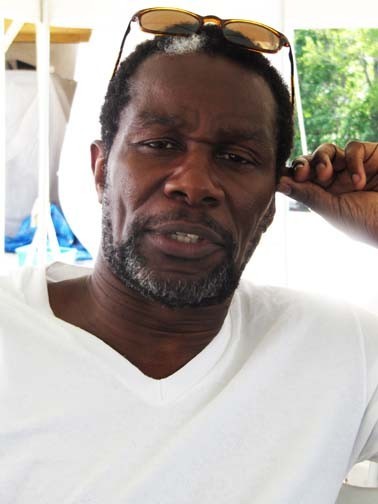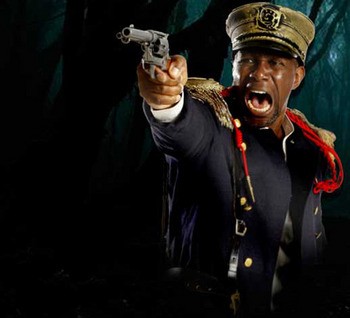John Douglas Thompson in Macbeth
Theatre for a New Audience Production March 20 to April 20
By: Charles Giuliano - Mar 07, 2011
Macbeth
By William Shakespeare
John Douglas Thompson as Macbeth
Directed by Arin Arbus
Theatre for a New Audience.
Duke Theatre on 42nd Street
Previews start March 12, opens March 20, through April 20
Cast: Justin Blanchard, Annika Boras, Denis Butkus, Peter Jay Fernandez, Ian Holcomb, Albert Jones, John Christopher Jones, Robert Langdon Lloyd, Saxon Palmer, Marquis Rodriguez, Roslyn Ruff, Christian Rummel, Tommy Schrider, John Douglas Thompson, Graham Winton, Andrew Zimmerman
Scenic & Puppet Design: Julian Crouch
Lighting Design: Marcus Doshi
Costume Design: Anita Yavich
Sound Design: Sarah Pickett
Running Time: 2 hours, 30 minutes with an intermission
When we spoke with John Douglas Thompson he was about to start several days of tech rehearsal with the first preview of Macbeth this Saturday, March 12.
As we have come to expect from his performances in Othello, Richard III, Antony and Cleopatra, and The Emperor Jones meticulous study has gone into preparation for the role of Macbeth.
He has worked with eleven editions of the play including a facsimile of the original folio which he feels most closely conveys the precise language, punctuation and verse of Shakespeare. He uses dictionaries and lexicons to find the precise definition of the language and its context in Elizabethan English.
The particular challenge of Macbeth is that it is a play that most literate individuals feel they know. Audiences come to the theatre with preconceptions based on having studied the play in school or seen it on stage and in films such a those by Orson Welles, Roman Polanski, and Akira Kurosawa.
In ongoing dialogues with Thompson there has been a learning process to leave those paradigms behind and come to the theatre with a fresh eye.
For the opening scene of Richard III, for example, it was shocking to encounter Thompson lying on the stage then slowly rising as he delivered “Now is the winter of our discontent.”
It was a very different interpretation which Thompson explained had evolved from his understanding of the text and then working with a director allowing for freedom of expression and invention.
We asked if there will be surprises in his Macbeth. Perhaps, he responded, but it is too soon to say as the play has yet to take a final form through tech rehearsals and previews. But he conveyed that striving to do something new or different would just be about novelty. What he conveys about the character must come from an understanding of the text and his humanity. Performances emerge from the inside out. Not everything that is initiated in the rehearsal room will make it through to opening night.
Thompson described working for a second time with the director Arin Arbus. Their first collaboration earned him an OBIE and Lucille Lortel Awards for Othello two seasons ago for Theatre for a New Audience. He expressed trust and a comfort level working with her again. He conveyed respect for her unique ability to interpret and direct the plays of Shakespeare.
Thompson discussed working as a partner and equal with Annika Boras whom he first saw several years ago in Romeo and Juliet at the American Repertory Theatre. "There was a rare chance to work with Cicely Berry, the world's foremost voice director. Annica and I jumped on the opportunity and we used it to work on the relationship of the Macbeths.The Macbeths are what Romeo and Juliet would be like if they had lived,” Thompson said.
This was indeed a remarkable experience. Cicely Frances Berry (born May 17, 1926) is the voice director of the Royal Shakespeare Company and is world-renowned in her work as a voice and text coach. She has conducted workshops all over the globe.
Enticed by the prophesy of the weird sisters they conspired to murder the king who is a guest in their home. When they seize the throne it sets in place their undoing.
Macbeth is a ferocious warrior who saved the kingdom on the battle field for Duncan. As a general Macbeth ended a civil war and repulsed an invasion. Thompson said "He was used to killing the enemy on the battle field. But this was personal, the murder of his cousin. When he emerged from the room Macbeth was a changed man. He was perhaps suffering from what we would today identify as post traumatic stress disorder."
In his study of the play and its period Thompson discussed that Duncan planned to name his son Malcolm as the Prince of Cumberland and his successor. Until then Scottish kings had been elevated by a council of peers. One earned the right to be king. Duncan went against that tradition by creating a dynasty. As cousin to Duncan, and his leading general, Macbeth reasons that he is deserving, as the weird sisters prophesy, to be the next king. They had predicted that he would be Thane of Cawdor. This is confirmed soon after through no effort on his part. If this prophesy was realized then what of their prediction "All hail Macbeth, thou shalt be king thereafter."
While Macbeth may feel that his is entitled to be king, as the witches predict, Malcolm, now proclaimed as Prince of Cumberland and heir, stands in the way.
In the five part series Women of Will which was performed last season at Shakespeare and Company, and will return this season, Tina Packer tracked how Shakespeare evolved in his understanding of women. In the canon Lady Macbeth is among his greatest and most compelling creations. There is the complex arc as she embraces the prophesy, urges her husband to action, is his partner in crime, and then descends into madness.
"Like Hamlet, Macbeth is a thinking man with a deep conscience who reasons his situation from every perceivable outcome. He also has a great moral center and an unparalleled imagination," Thompson said. "But where Hamlet is stymied, Macbeth is a man of action to his own detriment."
Thompson emphasized a key scene when Lady Macbeth taunted the wavering Macbeth. He has misgivings about murdering the king, the lord to whom he swore allegiance, and violating the trust of hospitality. The intesity of these lines will establish the reversal of Hamlet.
What beast was't, then,
That made you break this enterprise to me?
When you durst do it, then you were a man;
And, to be more than what you were, you would
Be so much more the man. Nor time nor place
Did then adhere, and yet you would make both:
They have made themselves, and that their fitness now
Does unmake you. I have given suck, and know
How tender 'tis to love the babe that milks me:
I would, while it was smiling in my face,
Have pluck'd my nipple from his boneless gums,
And dash'd the brains out, had I so sworn as you
Have done to this.
Strong stuff indeed. They had lost a child, which makes her statement the more remarkable. It also confirms her great love for him.
We asked Thompson about the commonality of the tragic characters he has played- Othello, Richard III, Marc Antony, and now Macbeth. Surprisingly, he described them as very effective warriors, fierce fighters, and brilliant generals. “They are all rock stars. With the exception of Marc Antony. He was formerly a rock star now in decline.” While they triumph on the battle field they all come to bad ends through tragic flaws- jealousy, ambition, greed, love and decadence.
Adding to the equation The Emperor Jones we have yet to see Thompson portray a character who survives. Well, actually, he ended the play still standing in John Patrick Shanley's The Dreamer Examines His Pillow.
With this much anticipated new production of Macbeth audiences will come to appreciate why Thompson is regarded as among the finest classical actors of his generation.






